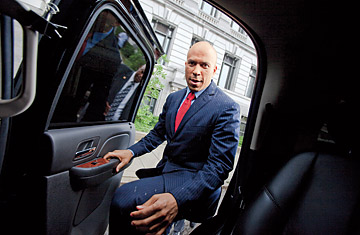
Cory Booker, Mayor of Newark, NJ, enters his SUV at City Hall while en route to a meeting.
(4 of 4)
Leadership, but for How Long?
Still, Booker's political future in Newark remains bright. According to an internal poll, he enjoys an 80% approval rating. More important, a strong opponent has yet to enter next year's mayoral election. Booker's victory looks like a foregone conclusion. "For the first time in my life, Newark is looked at more positively because of its mayor," says Steve Adubato Sr., a longtime local power broker, and former Booker foe, who runs a nonprofit in the city. "Newark is no longer a big joke."
Critics, however, offer legitimate complaints about Booker's leadership. Many city workers earn a handsome living — Newark has 264 municipal employees who make $100,000 or more. Plus, during 2007 and through the first eight months of 2008, Booker signed some 160 executive orders either giving an employee a pay raise or starting a new hire at a salary above the minimum set by civil-service guidelines. Some orders gave low-level workers a more livable wage. Others were a bit gratuitous. For example, one aide went from making $107,225 to $118,607. Isn't 107 grand enough to live on? The fiscal impact of these orders totaled about $1.5 million.
Booker staunchly defends the salaries. "I stand by any personnel decision I've made," he says. He points to a reduction of Newark's budget deficit, from $180 million to $73 million, according to the city, as a healthy return on his talent investments. A more professional and efficient city hall has helped Newark collect an extra $10 million in property taxes this year in spite of the foreclosure crisis. Further, Booker has proposed a 2% pay cut for all non-police and non-firefighter employees making more than $100,000 and is pushing for mandatory furloughs.
Booker, a former tight end at Stanford whose hands are longer than the Jersey Shore, possesses the oratorical gifts of Obama (unlike the President, he shuns teleprompters) and the eagerness to engage that carried Bill Clinton to the top. Unlike Clinton, Booker sometimes needs to read crowds a bit better. At a community event, he dropped a reference to the television show Frasier while playing Simon Says with a few dozen African-American kids and their parents. (Frazier was the last name of one of the participants.) The kids were mystified.
Geeky slipups aside, Booker's intellectual breadth and insatiable curiosity are impressive. But his critics are convinced that he'll bolt the city soon enough. The mayor, however, has promised to stay put. "I'm not going to give you any political baloney," he says. "At this point, I'm committed to two terms, and at the end of those two terms, if I stay in politics, I will look at other offices." (New Jersey will have a governor's race in 2013, near the end of what could be Booker's second term as Newark mayor.)
At about 9:30 on a warm June evening, after Booker has finished his radio show and is on his way to sell Newark to yet another philanthropist, I give him the ultimate no-win task. Grade yourself. Like any other good pol, Booker dodges. "It's very hard to feel you're doing an A performance when you still have a 12-year-old who gets shot," Booker says, recalling a recent incident (luckily, the boy has recovered). "But I do feel more hope and optimism than I've ever had in my life that we can get there. It's not an issue of can we. It's more an issue of will we. I do have a feeling that we control our own destiny." Now all he has to do is shock the world.
